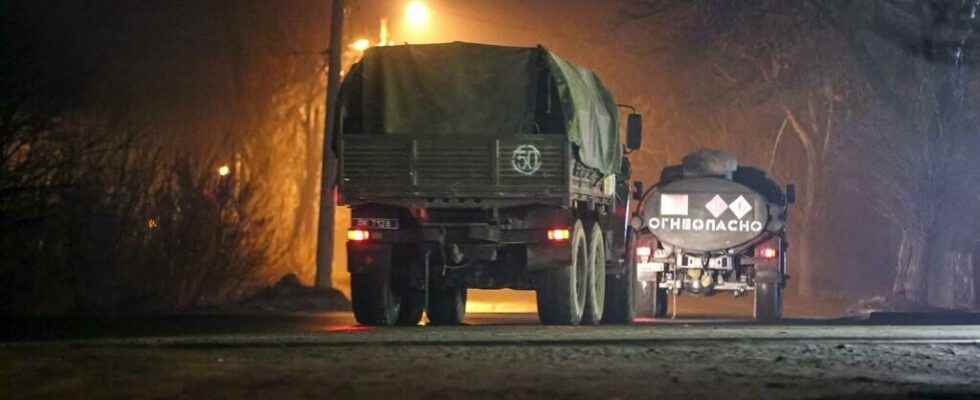Most newspapers return to the economic sanctions imposed on Russia. A first series of measures, before perhaps cracking down again soon. What the free newspaper Subway in London summarizes, quite colorfully, speaking of Vladimir Putin: “ Take it by the rubles. »
The Western press is rather unanimous on this question of sanctions, on the other hand the newspapers do not all have the same interpretation of Russian ambitions. The Australian is categorical: After Ukraine, Mr. Putin’s attention will turn to the Baltic states, then to Poland, then to the other former Soviet satellites, until Russia once again becomes the lord of Eastern Europe. »
This is not the analysis of the Italian newspaper La Repubblicafor who ” Putin’s goal is not a reissue of the Soviet Union. Today’s pole star is imperial ambition. An “imperialist nationalism”. From Ukraine to the Mediterranean, from Syria to Libya, from Central Africa to the Sahel. A challenge unprecedented since the end of the Cold War, that the great Western democracies must take up with firmness and determination. »
Advantage to Vladimir Putin
The Suddeutsche Zeitung warns: Russian President “ wants to impose a new order on Europe. For this, he is ready to go to war and impose enormous sacrifices on the continent. »
In the same vein, the New York Times believes that the Russian president has a whole host of strengths on his side. First, his appetite: Putin wants Ukraine under his thumb far more than the West wants to keep Ukraine in its orbit, and he’s willing to pay a higher price to get it “, writes the newspaper.
Then, his attention spans: Putin has methodically set himself the goal of bringing Ukraine back into his fold since at least 2004. For the West, Ukraine is another complex crisis that he will eventually tire of. »
Last advantage of the Russian president, his will: “ Putin wants to change the geopolitical order of Europe and is ready to take big risks to achieve this. The Biden administration wants to preserve a status quo wobbly and increasingly inert. ” And the New York Times concludes: Luck tends to favor the bold. »
A Western response deemed disappointing
The Israeli daily Ha’aretz is severe. ” It is so far a failure of Joe Biden’s campaign to limit Putin’s room for manoeuvre. It is also a failure of French President Emmanuel Macron’s presumptuous attempts to find a diplomatic solution to the crisis by building a new “European security architecture” in coordination with the Kremlin. It should be clear now to all Western leaders, whatever their strategy, that Putin neither lives nor operates in a reality they recognize. »
The Russian president who wishes, according to the newspaper The Australianhaving in any case only one interlocutor: The United States, as opposed to other NATO countries which are geographically closer to Russia. This reflects the Russian leader’s worldview that world affairs should be settled by the great powers, of which Russia is a part. NATO is seen as simply run by Washington. »
The daily The duty uses geography and history to better understand the situation. The Canadian newspaper explains that “ Russia has always felt geopolitically threatened on the side of its northern plains, from the Baltic Sea to Germany via Poland. From his point of view, Ukraine acts as a buffer zone between the West (actually NATO) and the Russian Empire. Moreover, etymologically, “Ukraine” means a march, a stronghold in a border area responsible for defending neighboring territories. »
another actor
China is providing quiet support to Moscow for now. China in ambush with an eye on Taiwan, according to the Swiss newspaper The weatherwhich warns: The scenario, still improbable a year or two ago, of a double offensive, first in Ukraine and then in Taiwan, can no longer be taken lightly. This is the nightmare of Pentagon strategists and a hypothesis that Europeans can no longer ignore. It is fed by the recurring declarations from Beijing and Moscow that the democratic world is bankrupt. »
Besides, the South China Morning Post tells us that the authorities in Taiwan take the threat very seriously. The President of the Island ordered the armed and security forces to intensify their surveillance, to remain attentive to military activities in the region and to strengthen combat readiness. »
The danger of mega-fires
In the midst of all this, information goes unnoticed when it concerns all continents. It’s the New York Times who talks about it. The United Nations has just published for the first time a very detailed report on the risk of forest fires: very devastating fires could increase by 57% by the end of the century.
Throughout the article, photos that recall the destructive force of fires and the powerlessness to contain them in the United States, India or South Africa. ” Global warming turns landscapes into powder kegs “, Write the New York Times and, like everything about climate change, the risks will not be the same for everyone. Especially since for the moment many governments have it all wrong: they focus on the fight against fires instead of concentrating on the management of forests.
